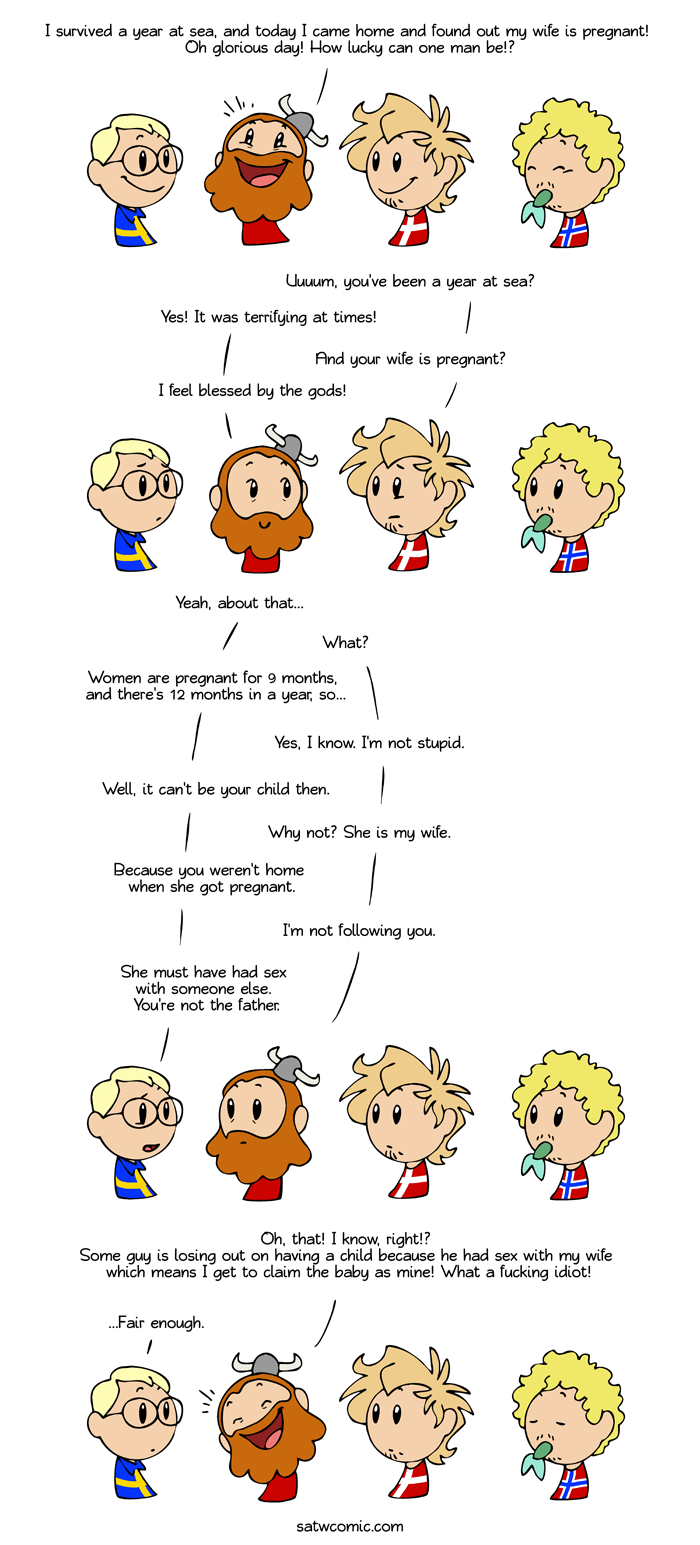
The post under the comic:
Something that was deeply offensive to most of the cultures the Vikings encountered was that Vikings didn't worry too much about fidelity, even the women could shag around, and their husbands happily accepted the children as their own even if they knew they weren't the father.
The reason was quite simple. Keeping a child alive was difficult back then so any child that survived was a miracle, and people wanted big families, so if your wife had a child it was your right as the husband to keep it. The other loser could mob around with one child less to his name.
(Some of the commenters suggest that this might not be historically accurate, but that's not relevant to what I'm blogging about today.)
Reading this comic, I found myself wondering if living in a culture that values biological paternity increases the likelihood that people will realize they don't want children of their own.
How I arrived at this idea:
Every adult around me growing up would have said, with absolute certainty, that having children is a blessing and a gift and a wonderful thing.
And every adult around me growing up would have said, with absolute certainty, that's it would be a horrific burden and the epitome of injustice for a man to end up raising another man's biological child.
Not so much of a blessing and a gift and a wonderful thing, that.
I think (although I can't be certain) my first exposure to the idea of children being work/a burden (as opposed to simply being baseline human reality) had something to do with this idea of raising another man's biological child being the epitome of injustice. I can't remember the details - it was probably something I absorbed from adults having adult conversation around me - but reading the comic stirred in me the forgotten knowledge that the two are inexorably linked in my mind.
I wonder: if I had never been exposed to the idea that raising another man's biological child is an injustice, and therefore to the idea that a child can be an undue burden, would I have entered the thought process that led me to realize I'm childfree? I think I'd probably still be childfree - essentially, I don't want children because I don't want actual human beings with thoughts and feelings and human rights that I need to keep forever - but I don't know if I'd ever consciously realize it. I might have been stuck on "Aww, babies are cute and funny and interesting!" and had children (or aspired to have children) on that basis.
I don't know if this could be studied - you'd need a population that thinks children are a gift regardless of biology and have access to reliable family planning and whose family planing intentions can be known (i.e. they have to be living or have a very robust and thorough diary culture, they'd have to be willing to speak honestly to researchers, etc.) And then, I'm sure, you'd need other comparable populations who don't think children are a gift regardless of biology but are comparable in every other respect, in order to control for variables that I can't even imagine. And then there's the question of which is cause and which is effect: do people see raising non-biological children as a burden because they value biological paternity? Or do they value biological paternity because they see raising children in general as a burden, so if the kid doesn't even have your genes why bother?
But it would be super interesting to study if it could be done!
3 comments:
And every adult around me growing up would have said, with absolute certainty, that's it would be a horrific burden and the epitome of injustice for a man to end up raising another man's biological child.
Any exception made for adoption, or for a woman's children from a previous marriage?
That never came up in conversation.
Extrapolating from what I know of personalities, I suspect if you asked them, they'd say "No, of course not!" And I suspect they hadn't actually thought about it.
But I also suspect that if they were exposed to a situation where a man was raising his wife's children from a previous marriage, they'd make him out to be disproportionately heroic - like they'd give him extra awesome points for them not being his biological children because of the cultural baggage associated with raising another man's child.
"Disproportionately heroic" -- what a great descriptive phrase! So many uses!
Post a Comment